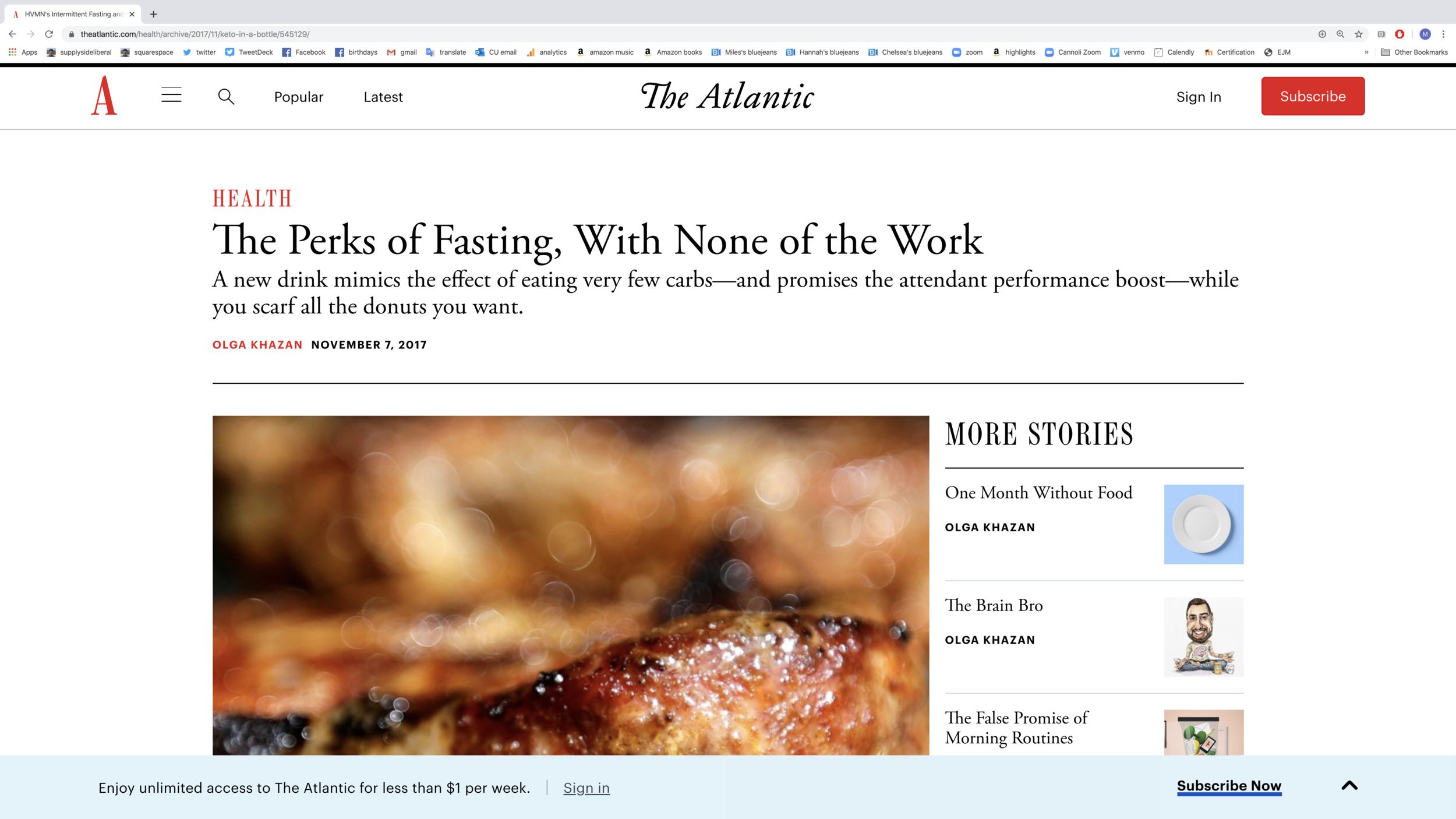The Benefits of Fasting are Looking So Clear People Try to Mimic Fasting without Fasting
In the environment of evolutionary adaptation on the African savannah or African coast, human beings reliably survived to become our ancestors only if they could survive periods without much of any food. Thus, human beings are designed by natural selection (in the extended sense of “designed” used by Daniel Dennett’s in his book Darwin’s Dangerous Idea) to go without food for extended periods of time—periods of time that occur somewhat systematically with the seasons and somewhat randomly. Thus, fasting—going without food for periods of time—though not without its own issues, is unlikely to be as dangerous as some people have suggested. (One of the biggest issues with fasting is that it changes the effective dosage of medication, so that anyone on prescription medication should talk to their doctor about fasting, and anyone using over-the-counter medications should think about using less when they fast.)
In addition, various other evolved mechanisms in the human body could be designed by natural selection on the assumption that there would be substantial periods without food. Thus, as more and more evidence is beginning to suggest, not fasting could be harmful to the normal functioning of the body.
The benefits of fasting are beginning to be recognized enough that people try to get the benefits of fasting without fasting. They want to get the benefits of fasting without fasting partly because fasting has a reputation as being harder than it is. Fasting is very hard when you are eating sugar, potatoes, rice, bread and other foods high on the insulin index when one is eating. (See “Forget Calorie Counting; It's the Insulin Index, Stupid.”) The main reason is that the transition from burning primarily blood sugar for energy to burning fat for energy is a wrenching transition. But if you cut out sugar, potatoes, rice, bread and other foods high on the insulin index, replacing those carbs with dietary fat, then when you fast your body only has to make the easy transition from burning dietary fat to burning body fat. If you try fasting given a current diet close to the American average, then cut out sugar, potatoes, rice and bread for six weeks, and then try fasting again, you can easily verify for yourself that it is much easier the second time around. (It is also worth experimenting with whether even a single lowcarb, highfat meal right before fasting makes it significantly easier.)
Although its devotees may not characterize it this way, I view a keto diet as a way of trying to get the benefits of fasting without fasting. Some keto products are useful for the low-insulin-index diet combined with frequent fasting that I recommend (especially products that are less processed than normal grocery store food and are without added sugar), but I have many qualms about a keto diet per se. In addition to my qualms that I detail in “The Keto Food Pyramid,” the keto diet seems unhealthily meat heavy to me. (See “Meat Is Amazingly Nutritious—But Is It Amazingly Nutritious for Cancer Cells, Too?)
I am not sure this matches everyone’s version of a keto diet, but Olga Khazan’s article shown above, “The Perks of Fasting, With None of the Work,” describes keto diets this way:
Because the keto diet can be unappealing—low on fruit and vegetables and high on bun-less burgers—it can be hard for all but the most committed to stick with it.
On the diet I recommend, nonstarchy vegetables and a certain amount of vegetables with resistant starches are big, so what I recommend certainly isn’t low on vegetables.
Geoff Woo’s company HVMN, featured in Olga Khazan’s article, released a drink called “Ketone” in 2017 described this way:
Its nutrition label says it contains 120 calories, but no carbs, no fat, and no protein. Instead, it’s all ketones, the chemical that Woo and his company are calling a “fourth food group.” He hopes the drink will allow people to reap the benefits of occasional fasting—high ketone levels inside the body—without actually having to not eat.
But Geoff Woo himself simply fasts:
Woo says he fasts for at least 18 hours a day and runs an 8,000-person-strong intermittent fasting group. He subscribes to fledgling evidence showing that fasting might help boost neurogenesis, or the growth of new brain cells, as well as lead to longevity.
One benefit to fasting instead of drinking “Ketone” are these two reviews of the taste of “Ketone” from Olga and Geoff:
It tasted like cough syrup that had been poured into a garbage bag and left in the sun.
“Augh!” I cried.
“I compare it to a combination of a liquor shot with nail-polish remover,” Woo said.
But one of the biggest reasons to fast instead of using a chemical substitute for fasting is that we have a much longer track record of evidence on fasting than on any chemical substitute for fasting.
I lay out my overall perspective and give some cautions about fasting in “4 Propositions on Weight Loss.” Take a look.
For annotated links to other posts on diet and health, see:
